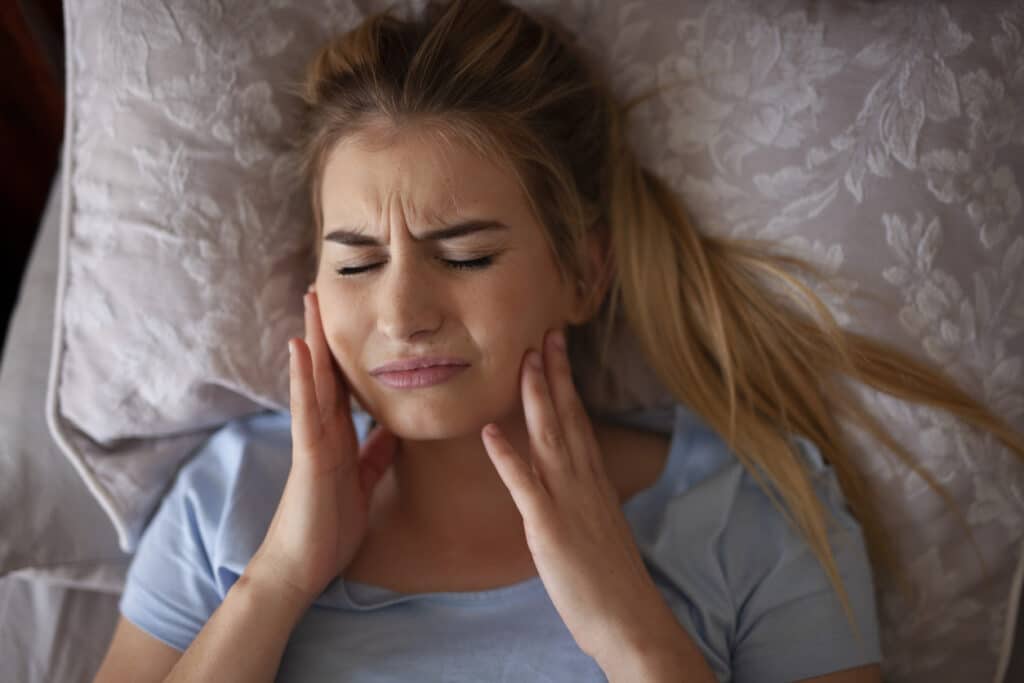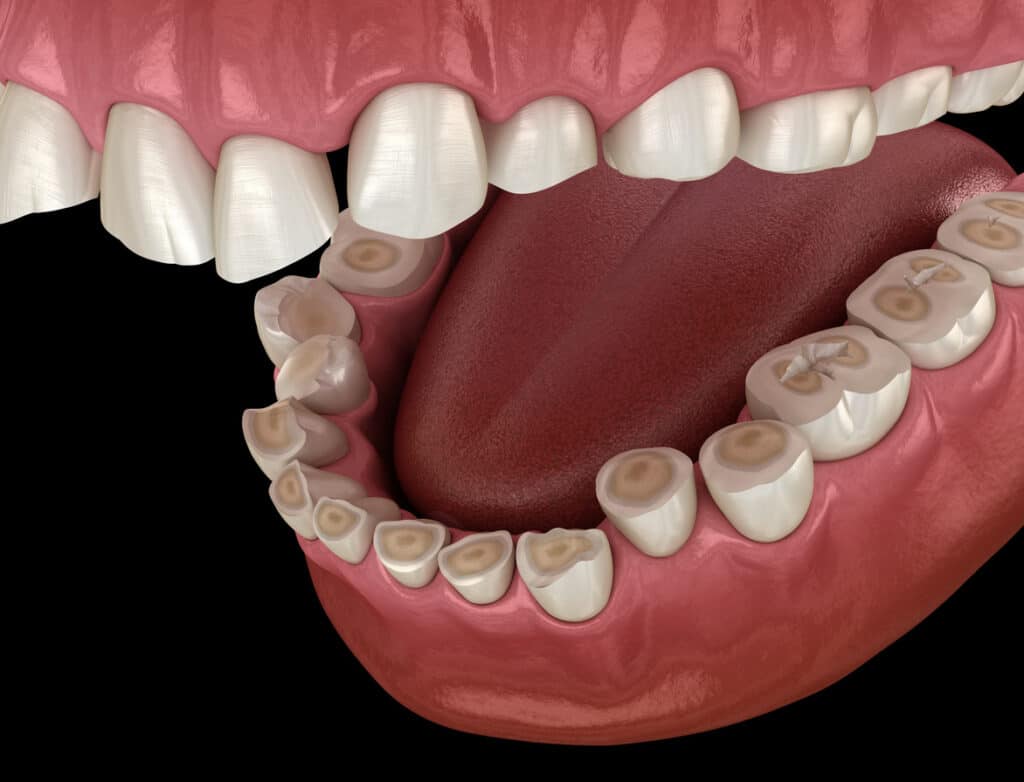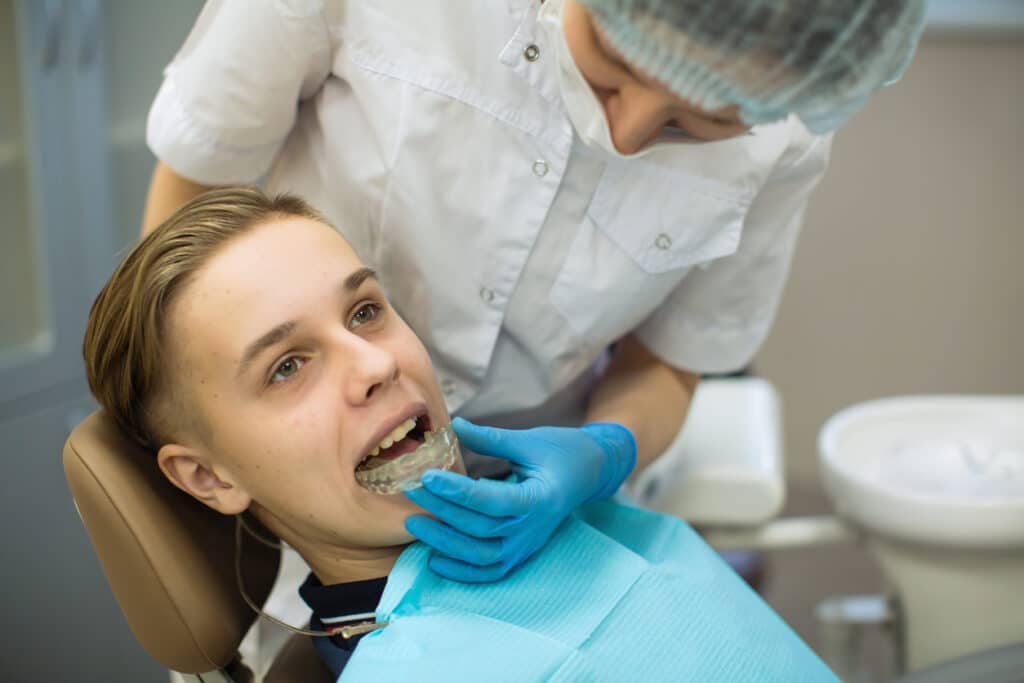About Bruxism
Bruxism is a disorder in which the patient grinds, gnashes or clenches their teeth. Although some individuals may experience bruxism during the day, it most frequently occurs during sleep. Occasional teeth grinding is not harmful but when bruxism occurs often, the teeth can be damaged and other oral complications may occur. Individuals who have bruxism are more likely to suffer from other sleep-related disorders, such as snoring or sleep apnea. Sleep partners may notice bruxism in one another and dentists can often diagnose the disorder based on evidence of damage to teeth or crowns they discover during routine examinations.
Risk Factors For Bruxism
There is no specific known cause for bruxism, and for unknown reasons it is common in young children, often disappearing in adolescence. Individuals are more at risk for the disorder if they:
- Have certain abnormalities of the jaw
- Are stressed or anxious
- Have other sleep disorders
- Have missing, crooked, or misaligned teeth
- Drink alcohol to excess
- Are highly competitive or aggressive
- Smoke or drink caffeinated beverages
- Take illegal stimulants

Because stress, smoking, and consumption of alcohol, caffeine and recreational drugs can play a part in bruxism, healthy life changes and relaxation exercises, especially those involving the jaw and mouth, may help to resolve the problem.
Risks of leaving bruxism untreated
While everyone occasionally grinds their teeth, when it is chronic bruxism there can be real long-term tooth damage.
- Grinding causes teeth to be flattened.
- It can cause teeth to fracture and break.
- It can chip and loosen teeth.
- It can wear down tooth enamel exposing deeper layers of the teeth.
Symptoms Of Bruxism
Over time bruxism can wear down enamel, chip, and even fracture or loosen teeth. Bruxism can also cause damage to the inner cheek or tongue. During a dental examination, the dentist may discover early signs of the disorder, which is one of the reasons that regular dental check-ups are vital. Apart from a sleep partner reporting the sound of teeth grinding or clenching, the patient may become aware of the condition because they experience one or more of the following symptoms:
- Facial or jaw pain
- Tight or fatigued jaw muscles
- Feeling that the jaw won’t open or close completely
- Earache
- Headache at the temples
- Difficulty sleeping through the night
- Increased tooth sensitivity

A clicking sound as the jaw is opened or closed, typical of patients with TMJ, is often indicative of bruxism.
How is bruxism diagnosed?
When Dr. Fong sees a patient with certain signs of worn teeth or prosthetics like crowns, he may suspect the patient has problems with bruxism at night. Often this will show in consecutive appointments, as there may be progressive changes in the patient’s teeth that are far beyond normal wear.
At this point, he’ll ask you about your sleep habits, daily routines, overall dental health, any medications you’re taking.
Then it’s time to evaluate the extent of your nightly grinding. He’ll check for:
- Tenderness in your jaw muscles
- Obvious dental abnormalities, such as broken or missing teeth
- Other damage to your teeth and underlying bone, through the use of x-rays
He’ll test to be sure your bruxism isn’t due to the temporomandibular joint disorder.
Treatment Of Bruxism
The need for treatment can vary. For instance, many of us have temporary stresses to enter our lives, and they may cause jaw clenching and tooth grinding. But these often resolve when the stress goes away. But when the signs of bruxism are obvious and your teeth are being degraded, Dr. Fong may use some of these treatments:
- Splints and mouth guards — We custom fit a mouth guard or splint whose job is to keep your teeth separated. This stops the ability of the teeth to meet and grind against each other. These fit over the upper and lower teeth.
- Dental correction — When a person has severe bruxism, their tooth wear has led to sensitivity and it is affecting the bite. Now it’s necessary to place crowns on overworn teeth. Inlays and Onlays may also be successful.
- Stress management — Coping strategies allow the person to better handle the stress in their life, such as meditation.
- Behavior change — Dr. Fong can show you how your mouth and jaw should be positioned. You can then try and train your jaw to stay in this position.
- Biofeedback — This behavior modification system uses monitoring procedures and equipment to teach you how to control muscle activity in your jaw.
-
Medications — In some patients, the best course may be a medication. These include:
- Muscle relaxants. These can calm the muscles that clench your jaw and grind your teeth.
- Botox injections. Botox works by blocking nerve messages in the muscles. For bruxism, this calms the muscles responsible.
- Anxiety or stress medication. Short-term use of antidepressants or anti-anxiety medications can help you deal with stress or other emotional issues that are causing your bruxism.
How to treat teeth damaged by bruxism
Chronic bruxism can thoroughly damage the teeth. In these situations, Dr. Fong could opt to use Bioclear. This is a system for tooth reshaping and repair that uses clear tooth-shaped forms to rebuild damaged teeth. Dr. Fong chooses the thin mylar form for the tooth he is addressing from over 20 different tooth shapes. This will provide the mold for the damaged tooth to be remade. The form will slip just under the gumline and wrap the tooth. Next, a warmed composite resin is injected into the form. This resin is different than traditional bonding composite. The warm resin fills the form, and it is then hardened with the application of ultraviolet light. The final step is for Dr. Fong to further shape and polish the tooth to blend in seamlessly with the surrounding teeth.

Thanks to Bioclear, the damaged teeth can once again be back to their original full size. This contrasts with placing porcelain veneers over the damaged teeth to change their shape. When veneers are placed, some of the tooth enamel needs to be removed to make room for the veneers on the tooth front. This is a permanent removal of the exterior tooth surface. Bioclear builds damaged teeth back up, and it does so in a more conservative approach.
How does Bioclear work?
Bioclear doesn’t treat bruxism; it treats the damage done by bruxism. Once a patient’s causes of bruxism are addressed, then Dr. Fong can use Bioclear forms to build the tooth back to its original size.
This dramatically improves the aesthetic of the patient’s smile. This gives the patient new confidence in his or her smile, and this provides a whole new level of confidence in social situations.
Can a mouth guard make my bruxism worse?
Mouthguards protect the teeth from the forces of grinding. The problem with them is that they don’t do anything to treat the cause of bruxism. That could be sleep apnea or temporomandibular joint disorder. Those conditions need to be addressed in addition to wearing a mouth guard for protection.
The main thing is to get a mouth guard that fits your teeth precisely, a custom-formed mouth guard. That’s the kind Dr. Fong provides for our patients. When patients buy one-size-fits-all mouth guards, they don’t fit well and this can actually exacerbate a person’s grinding.
At home treatments
Bruxism can be prevented with some lifestyle changes:
- Reduce stress — Exercise. Meditate. Take a warm bath. Find ways to handle your stress and let it keep from making your tense.
- Avoid stimulants in the evening — Don’t drink caffeinated coffee or caffeinated team after dinner, as this can worsen bruxism.
- Practice good sleep habits — Sound sleep typically doesn’t involve grinding.
- Talk with your sleep partner — Ask your partner if they are aware of any grinding or clicking sounds that you’re making while you’re sleeping. These will need to be reported to Dr. Fong.
- Keep your twice-yearly professional exams and cleanings — Bruxism needs to be identified as early as possible to minimize tooth damage. Dr. Fong can spot signs during these regular exams and treat your bruxism.
Is treatment covered by insurance?
Some are and some are not. Mouthguards are typically covered. But other treatments, such as Bioclear, are considered cosmetic so they may not be covered. The best way to find out is to call your insurance provider and ask directly if they cover treatment for bruxism.
